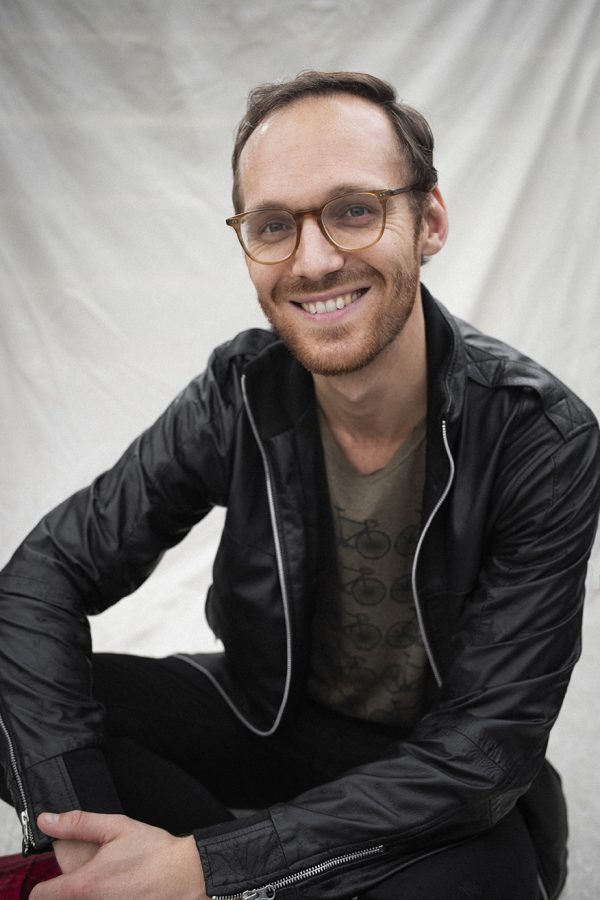For Timo Vollbrecht, a Steinhardt doctoral student in Jazz Studies and Composition, capturing the essence of worldly encounters is just a regular day’s work.
The internationally-performing saxophonist, composer and reeds player — emerging from Berlin’s innovative music scene and taking inspiration from the lively music scene of the Big Apple — has toured in over 30 countries with his quartet, Fly Magic. The group combines elements of jazz, post-rock and contemporary sound culture in its music.
The German-born musician is no stranger to being both a frontman and a tentative band member. In both roles, he’s garnered acclaim through numerous awards, such as the German Youth Jazz Awards, the Praetorius Music Award and the Winning Jazz Award of the Hanover Jazz Club.
“I want to be an artist that is like a citizen musician,” Vollbrecht said. “I want to produce art that is situated in cultural context and is in direct relevance to the environment that is around me. I think that’s the point of it. I don’t just listen to jazz — you have lots of influences when you’re an open-minded person who listens to music and consumes art.”
While touring around Aleppo, Syria, Vollbrecht found himself lost in the city and decided to ask a local for directions. Unbeknownst to him, a man named Muhammad took Vollbrecht through the city on a grand tour and returned the musician to his hotel, calling on two young boys to personally escort him back.
“It was this really human, humbling experience I had. And then, the war broke out in Syria, and a lot of people fled to Germany,” Vollbrecht said. “I was thinking, ‘what happened to this dude? He might be in the country that I’m from.’”
From that experience, Vollbrecht wrote “Muhammad,” a melancholic yet powerful composition. The song garnered such a positive reaction among live audiences that Vollbrecht decided to release an entire album based on memorable experiences from around the world, titled “Faces in Places.”
Back in his hometown of Stadthagen, Germany, Vollbrecht began his journey in music during his teenage years as he played along to the famous American saxophonist Sonny Rollins’ records. After being gifted a toy saxophone at a young age, he became fascinated with the instrument and started taking lessons at school. “It was just luck,” Vollbrecht said of finding his instrumental niche.
After taking part in a high school exchange program in Wyoming, nearly 8,000 miles away from home, Vollbrecht studied at the Berlin University for the Arts for his undergraduate studies before taking the big leap to New York for his graduate work.
Vollbrecht attended NYU’s master’s program where he received a Master of Music in Jazz Saxophone. These years gave him the opportunity to learn from some of the program’s renowned faculty, like David Schroeder and Mark Turner. The inspiration from these extraordinary musicians was so fulfilling that Vollbrecht returned to NYU to pursue a doctorate in Jazz Performance and Composition.
“As a jazz player, New York has the biggest jazz scene and the most prominent,” Vollbrecht said. “All the bands that I was listening to were here, so I really wanted to come here at some point. I came here on a Fulbright grant in 2010 and thought I’d be here for a year. Now, I’m still here doing my Ph.D.”
Since he’s been in the U.S., Vollbrecht has found his community within New York City mainly by making music with others. Fly Magic bandmate and roommate Elias Stemeseder praised Vollbrecht as a friend and fellow musician.
“Despite his very clear compositional and sonic trajectory, Timo is really open to new musical ideas, and willing to explore where these ideas might take his songs,” Stemeseder said. “His open-mindedness makes it a real joy to work on music together. I’ve played his exact same pieces with different combinations of people, the results often being radically different. Timo seems to be happy with any outcome — from extremely polished to extremely raw — as long as the music has that certain directness and spontaneity that he’s looking for.”
In his global performing career, Vollbrecht professes that, while the overall schedule of live shows is the same, there are minute cultural differences that make a show stand out. During a show he played in China, the applause was short-lived. In Europe, however, the crowds clap generously and demand an encore; it’s practically a ritual.
“It’s really the intimate [and] small places that I really enjoy, like Rockwood or something like that,” Vollbrecht said. “You’re closer to the audience. It’s more intimate. You feel the audience better.”

Charlotte Greve, a colleague and longtime friend of Vollbrecht, met the musician at a jazz competition during their high school years. Though years have passed since their first meeting, the two still play together, mostly in large ensembles.
“We enjoy updating each other on recent life during rehearsal,” Greve said. “It’s just endless talks about life, being a musician, being [the] band leader and sharing a similar path of growing up in a similar way and then moving to New York.”
Even with so much support, Vollbrecht is left to his own devices to define his sound, which is very much informed by his experiences and travels.
“It’s always hard to brand whatever you do,” Vollbrecht said. “‘Oh, it’s a jazz show.’ What is a jazz show? It could be like a swing thing but it could be something like what we do, which is a lot more experimental in a way and fuses with other genres like indie or prog-rock or post-rock, experimental soundscapes, whatever … once the word jazz is in there, it’s a jazz concert. ‘We know that drawer, let’s put you there.’”
What Vollbrecht hopes to convey in his multi-faceted and genre-bending music is an intimacy between the performer and the audience. For his band, each concert brings new opportunities to make a personal connection with a crowd.
“You share time with other people and express whatever is on your mind, especially with music that is originally composed and, with improvisations, it’s very in the moment,” Vollbrecht said. “That’s why we [perform], I would say. There is some sort of synchronicity between the band and the audience and it can be very powerful and very intense and it can also be like super distant. It really depends on the venue. That is what is pretty much the same about playing anywhere.”
A version of this article appeared in the Thursday, Oct. 11 Arts Issue on pages 12-13. Read more from the Arts Issue here. Email Nicole Rosenthal at [email protected].


























































































































































